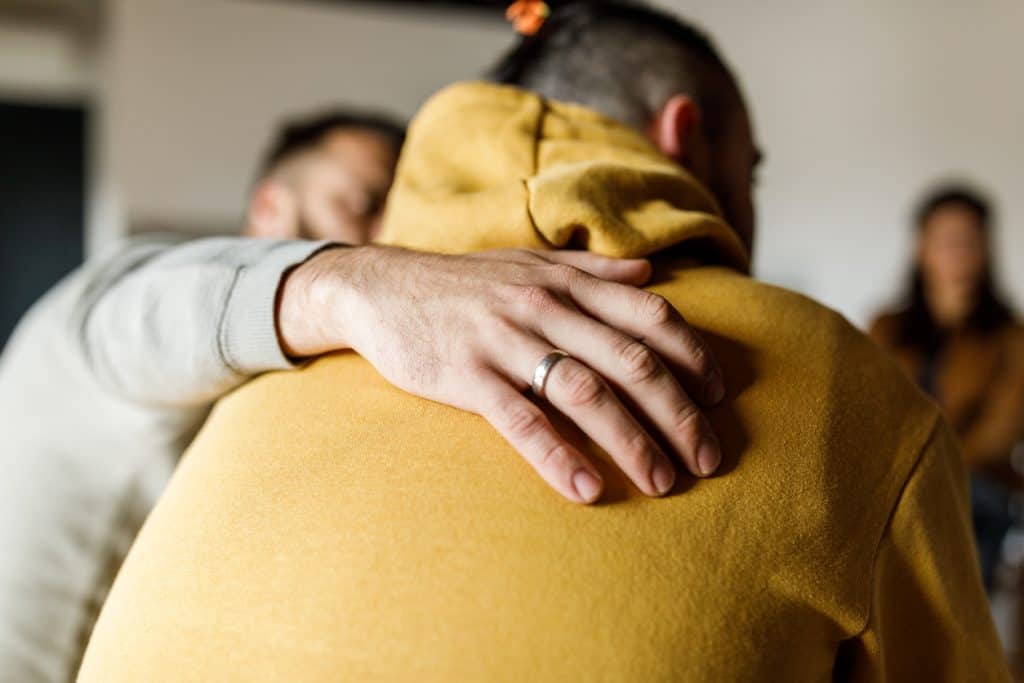Why would a Christian have such a personal battle with something he or she believes is wrong? Let’s check out three hidden reasons it’s so hard to go more than a few steps on the recovery journey. All three are driven by pride.
The first hidden reason is denial.
Countless men and women who have found healing look back on their first steps of life change and point to denial as one of their biggest barriers. After all, we can’t heal if we don’t admit we have a problem, right?
We all want to be accepted, appreciated, and admired. We glow when focusing on our strengths and deflect when faced with failings. We shove our weaknesses under rugs and out of sight because they are weighty and difficult to face. So we learn to practice denial—even since childhood.
Denial comes in many forms. Through denial, we downplay, ignore, and distort how pornography impacts our lives and relationships with God and others. We minimize how often we fail and overplay how long it’s been since we last watched porn.
Common Examples of Denial
A person might say, “As long as nobody knows, no one will get hurt,” or, “Lots of Christians struggle with porn. I’ve even heard my pastor talk about how this is a life-long struggle,” or, “I just don’t see what’s wrong with watching porn.”
Christians might downplay how long porn has been part of their lives and how feeble and ineffective their attempts have been to quit.
A person might attribute their ongoing desires for orgasm to evolution. Or they might indict God for creating sexual desire, “This is God’s fault. He made me this way. I can’t control it. Blame him, not me!”
A Christian might minimize how memories of past wounds, boredom, depression, and other emotional states coincide with porn use. Or he or she might rationalize how porn use is an ongoing means to cope with stress, misgivings, and life in general. They might blame circumstances or others for their porn use.
- “I had a hard day/week. I deserve this release.”
- “If my spouse was more exciting or more available for sex, I could conquer this problem.”
- “I’m single, and porn is my outlet for sexual tension.”
- “That person made me upset and that’s why I sought porn.”
There are many ways to blame and minimize, all of which are forms of denial. Proverbs 11:2 tells us, “When arrogance comes, disgrace follows, but with humility comes wisdom.” In other words, if we want to move past pornography in our lives, we first need to humble ourselves and admit that we have a problem.
The second hidden reason is self-sufficiency.
Society idolizes independence and individual strength. And there is nothing wrong with competence, strength, and capability because those traits allow us to serve others.
But when we deny our weaknesses because of pride, our self-sufficient attitudes keep us trapped. It leads to isolation in the very places of our lives where we desperately need a friend to give us a helping hand.
“Two are better than one because they have a good reward for their efforts. For if either falls, his companion can lift him up; but pity the one who falls without another to lift him up” (Ecclesiastes 4:9-10).
Self-sufficiency embraces bravado. Even when we are incapable, we project strength where we are insecure. The ego is too fragile to admit there is a problem that we can’t solve on our own.
A person might say, “I don’t need help from others. My struggle isn’t so bad that I can’t quit on my own. I went for ‘X number of days or weeks’ without porn in the past. I can fix this by myself if I just try harder.”
Self-Sufficiency as Religiosity
Sometimes this self-sufficiency is clothed in religiosity. Christians proclaim that since only God can forgive, only he needs to know. Individual philosophies might claim greater personal power to overcome sin, and thus they don’t need others.
When we want freedom from our nagging habitual sins, we often want a private solution to our seemingly private problem. We don’t want to involve anyone else. But what if the Bible doesn’t point us to private solutions? What if Christian relationships are one of God’s means of changing us from the inside out?
We need to ask ourselves, what part of James 5:16 do we deny? “Therefore, confess your sins to one another and pray for one another, so that you may be healed.”
Remember, the lone wolf fails. We need community to serve as a guardrail against the temptations of porn.
The third hidden problem is secrecy.
Secrecy comes easy. Life’s experiences teach that we have a public self to project to others and a private self that is tucked away from view and discussion. We classify the parts of ourselves that are accepted and rejected.
Keeping sinful secrets might also have been part of your family dynamic from an early age, especially if there was violence or abuse in the home. (If there was, we highly recommend seeking professional counseling.)
As Christians, we have learned what sins are acceptable to discuss, such as anger and telling white lies. We also come to accept that some sins, like a struggle with porn and unwanted sexual behaviors, seem too nasty.
To avoid public and religious rejection, we keep quiet. And by doing so, our pain and struggle become more intense. Our sense of self erodes a little more each time we engage in pornography. It is a slow death of the soul, mind, and body.
We are as sick as our secrets.
Before King David confessed his sins, he was tormented by what he kept hidden. “When I kept silent, my bones became brittle from my groaning all day long. For day and night your hand was heavy on me; my strength was drained as in the summer’s heat” (Psalm 32:3-4).
The Antidote to Secrecy
Again, James 5:16 says, “Therefore, confess your sins to one another and pray for one another, so that you may be healed.”
Read that verse over again and meditate on this truth: Confession to each other is part of the healing process. We release much anxiety and receive a great amount of comfort when we share our burdens with others.
Remember: We stay stuck because we deny our problems, claim we are self-sufficient, and live in secrecy.
Take some time to journal how you have seen those truths play out in your life. The following questions are prompts. If other questions come to mind, answer those as well.
- How have I minimized my behaviors with porn?
- How have I blamed others and circumstances?
- How has self-sufficiency and willpower failed me?
- How does my secrecy keep me from receiving support?
To help you get unstuck, Covenant Eyes has created a free app packed with courses that walk you through the path to victory!








Porn is destroying my relationship with out Lord and Savior Jesus Christ.